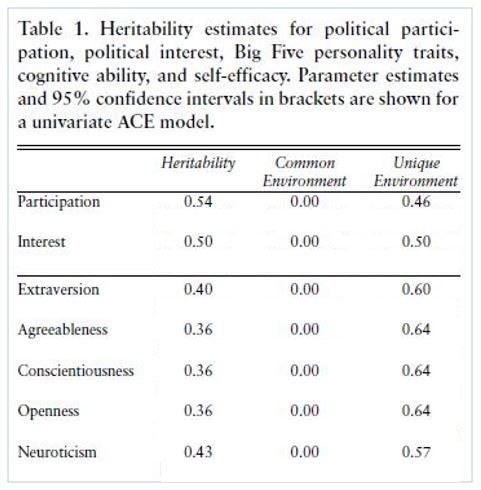Politics
Nature and Nurture: Connecting Personality to Politics
How genes and psychological traits are linked to politics.
Posted September 8, 2019

The debate about nature versus nurture goes back to humans’ earliest days of intellectual dispute. Classical Greek thinkers like Plato and Aristotle picked their sides on the causes of human behavior as early as the 5th and 4th centuries BC. Plato endorsed nature and Aristotle nurture. And the debate about whether we are genetically determined or a "blank slate" has raged ever since.
Fast forward to today, and we know from behavioral genetics that our behavior is, in fact, the result of both. It’s not nature versus nurture, it’s nature and nurture. Our behavior is the result of the interaction between our genes and environment. It’s both inherited and learned.
There are lots of interesting behaviors to try to understand in our world: loving, working, fighting, learning, and many more. And one really important behavior to understand is sharing. In particular, how do we share scarce resources in society? That is the driving question in politics, as eminent political scientist Harold Lasswell pointed out in his 1936 book, Politics: Who Gets What, When, and How.
Genes, Psychology, and Politics
A lot of research shows that genes play a key role in political engagement. This is not surprising. Remember, behavioral genetics has shown our behavior is a result of both our genes and our environment.
A lot of research also shows that psychological factors like the Big Five personality traits (conscientiousness, agreeableness, neuroticism, openness, and extraversion) play an important role in whether a person is politically engaged or not. In particular, openness has a big effect on a person’s level of political engagement.
So, if genetic traits are associated with political engagement, and psychological traits are associated with political engagement, could there be a connection between psychological traits, genetic traits, and political engagement?
Connecting the Three
A team of researchers* from the US, Canada, and Germany came together to study this question. They specifically asked “whether the relationship between psychological traits and political engagement is primarily driven by environmental or genetic factors” (Weinschenk et al., 2019: 4).
To answer their question, they analyzed a new database of same-sex twin pairs in Germany. The twins were asked, among other things, questions to determine their personality traits, cognitive abilities, political interest, and political activities.
Not surprisingly, their results showed that openness, in particular, was associated with political participation and political interest. That is, the twins who were more open-minded and willing to engage in new experiences were more likely to participate and be interested in politics.
Table 1 shows some of their interesting results regarding genetics. It shows that genes explain at least half of the variation in the twins’ political participation (54%) and interest in politics (50%). In this study, political participation was indicated by actions like turning out to vote, participating in political meetings, and joining a boycott. Political interest was measured by a twin answering s/he was completely disinterested in politics up to extremely interested.

The table also shows that genes play a substantial role in personality traits (explaining from 36% to 43% of the variation in these traits). Yes, nature matters.
But it also shows that nurture, in the form of learning and experiences unique to an individual, also matters. Environment accounts for about half of the variation in the political measures (46% to 50%) and well more than half of the personality measures (57% to 64%).
This is interesting, but it really just confirms a lot of what we already know: both one’s genes and one’s experience affect her or his political engagement. The major advance of this research is what it shows about how genes and the environment affect the relationship between psychological traits and political participation.
In the end, it’s a bit of a complicated story that boils down to this: Genes common to both personality (specifically openness) and political engagement account for more than two-thirds (67%) of the correlation between personality and participation and well more than half (63%) of the correlation between personality and interest.
More to Come, Hopefully
That’s really exciting and important to know. What’s still unresolved, though, is the actual mechanism. Do genetic factors shape psychological traits that in turn influence political participation, or do genes and psychological traits operate independently on political participation? As we scientists like to say, “that question is open to further research.”
Overall, this cool article shows that nature and nurture matter. But they matter in a complicated way that would astound Plato and Aristotle. Stay tuned for further research on this centuries-old debate.
* Aaron C. Weinschenk, University of Wisconsin-Green Bay; Christopher T. Dawes, New York University; Christian Kandler, University of Bremen; Edward Bell, Brescia University College at Western University; and Rainer Riemann, Bielefeld University
References
Weinschenk, Aaron C., Christopher T. Dawes, Christian Kandler, Edward Bell, and Rainer Riemann. 2019. "New evidence on the link between genes, psychological traits, and political engagement." Politics and the Life Sciences 38(1): 1-13. https://doi.org/10.1017/pls.2019.3




